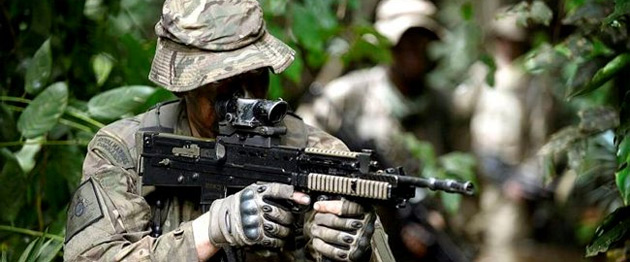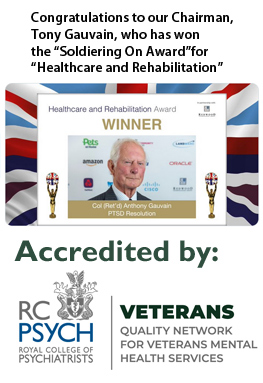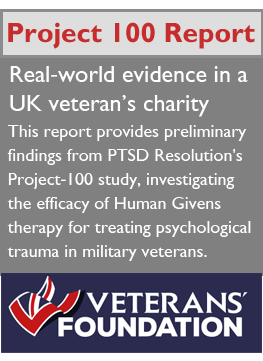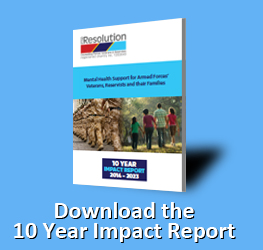Key Facts

Guiding Principles
Downloads
Articles
PTSD Resolution: Key Facts
(a).PTSD Resolution is a charity assisting servicemen and women and family members, over the age of 12 years, to relieve mental health problems resulting from military service, to ease reintegration into a normal work & family life. According to an evaluation by Kings College military mental health unit (2), PTSD Resolution’s therapy outcomes are comparable to those provided by primary care therapy services in England (Improving Access to Psychological Therapies (IAPT). It should be noted that Resolution works with a more distressed client group than the IAPT.
Resolution works with a more distressed client group than the IAPT, and yet achieves a comparable recovery rate. Drop-out rate is also lower. Click here to download the full report.
See testimonials here.
(b). The PTSD Resolution national outreach programme has over 200 counsellors. It is private, confidential, local, and one-to-one. No referral is needed, thus reducing any sense of stigma. Counselling is brief and effective – an average of five one-hour sessions.
(c). PTSD Resolution offers employers Trauma Awareness Training to support the successful integration of Veterans and Reservists in the workplace. The half-day modular courses enable line managers and HR staff to recognise potential symptoms of trauma and identify a clear route to resolving any workplace difficulties
(d). Resolution counsellors are trained in a form of Trauma-Focused Cognitive Behavioural Therapy (TFCBT) consistent with the guidelines of the National Institute for Health and Clinical Excellence (NICE). The charity’s role is to provide a contact point for those requiring counselling and to arrange immediate, brief, local effective counselling , and to record the results.
(e). Veterans, Reservists and family members are not required to talk about the traumatic events. The programme policy is that re-exposure is better done in the client’s visual imagination and while in a relaxed state, protecting confidentiality and reducing distress. This is a relatively new development of TFCBT, similar to Imagery Re-scripting and Reprocessing Therapy (IRRT). (1)
(f). The Resolution network was launched in February 2010, following a three-year pilot programme, which included a project with the Falklands Veterans Foundation (www.fvf.org.uk ) that helped ex-services personnel recover from symptoms which had lasted 25 years in some cases.
(g). The success rate of the programme is reported above, in (a). Other relevant studies are quoted in the bibliography below.
(h). Our therapy is complementary to the work of other armed forces charities, because it can resolve the immediate mental health issues that may be barriers to successful help under reintegration and resettlement programmes.
(i). Our therapists work in prisons, and there is an active programme of engagement with the prison service nationally. . An estimated 8,500 veterans are in prison, with 3,000 on parole (4). NAPO estimates that half this number suffer from PTSD and related disorders. The President of the charity is Lord Ramsbotham, former Inspector of Prisons, and the Vice-President is Lord Arbuthnot of Edrom.
(j). Resolution provides a service that is absent from the national provision for mental health; of those veterans that access treatment through other channels, research suggests that the majority approach their GP and just receive medication, without dealing with the trauma. One study of vulnerable veterans found that only 4% of those seeking help had been offered evidence-based therapeutic help (5).
For further information Contact PTSD Resolution at www.ptsdresolution.org or Tel 0300 302 0551 or e-mail contact@ptsdresolution.org. - Facebook: http://is.gd/4RPUV Press information: Patrick Rea - Tel 020 8870 4976
References:-
(1) Holmes, E. A., et al., 2007. Imagery rescripting in cognitive behaviour therapy. Journal of Behavior Therapy and Experimental Psychiatry
(2) Note: We do not insist on a formal diagnosis of PTSD: we measure trauma symptoms via a recognised measure, the Impact of Event Scale (IES). Using this self-reporting measure allows the person and the therapist to gauge their progress through therapy. According to an evaluation by Kings College military mental health unit, PTSD Resolution's therapy outcomes are comparable to those provided by primary care therapy services in England (Improving Access to Psychological Therapies (IAPT). It should be noted that Resolution works with a more distressed client group than the IAPT. Click here to download the full report.
(3) Andrews, W.P. et al., 2011. Piloting a practice research network: A 12-month
evaluation of the Human Givens approach in primary care at a general medical practice. Psychology and Psychotherapy: Theory, Research and Practice
(4) Ex-Armed Forces Personnel and the Criminal Justice System: NAPO Report, August 2008
(5) Iverson, A., van Staden, L., Hughes, J., Browne, T., Hull, I., Hall, J., et al. (2009) The prevalence of common mental disorders and PTSD in the UK military: using data from a clinical interview-based study. BMC Psychiatry. 9:68
updated 12.04.2023.




